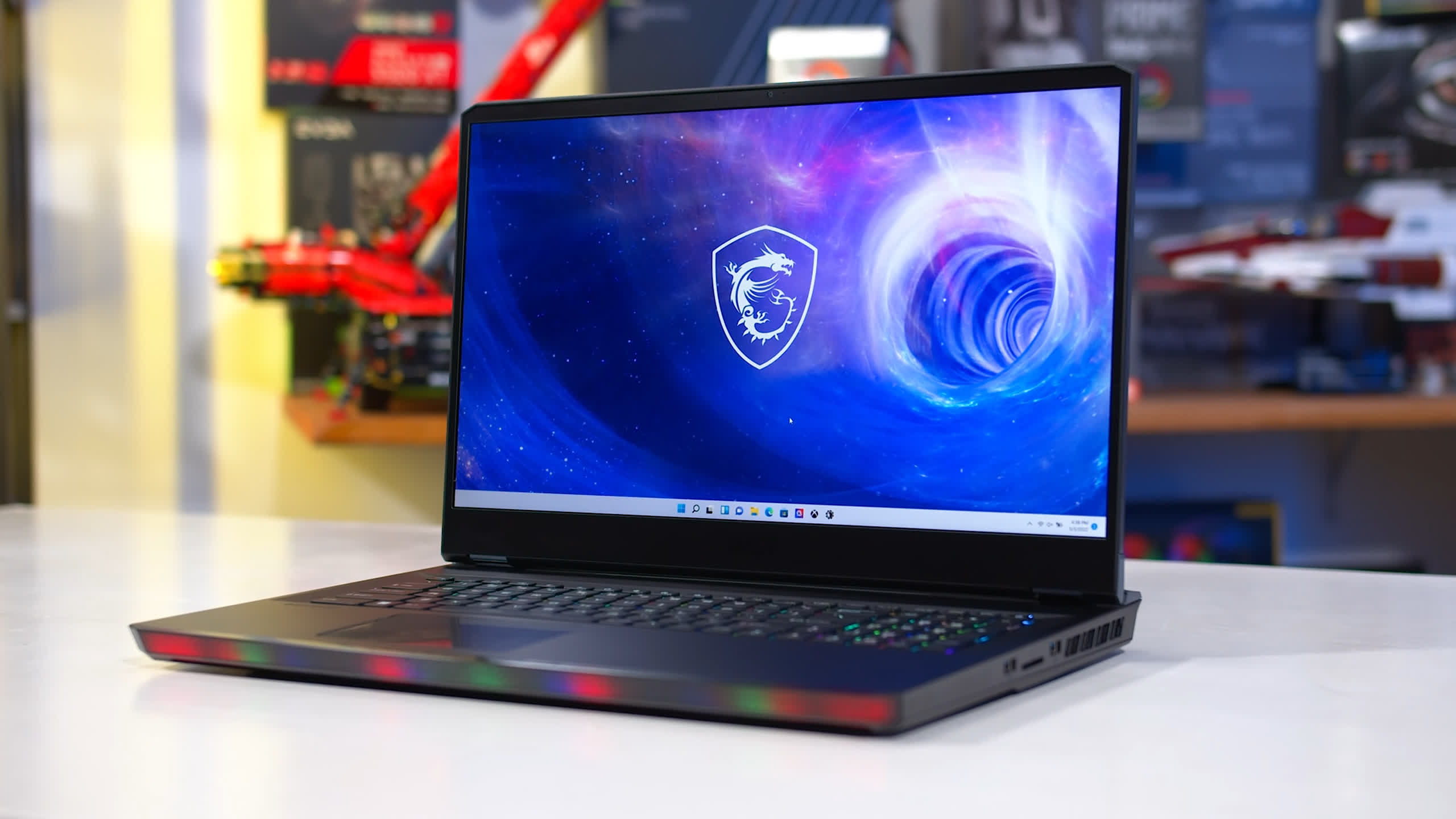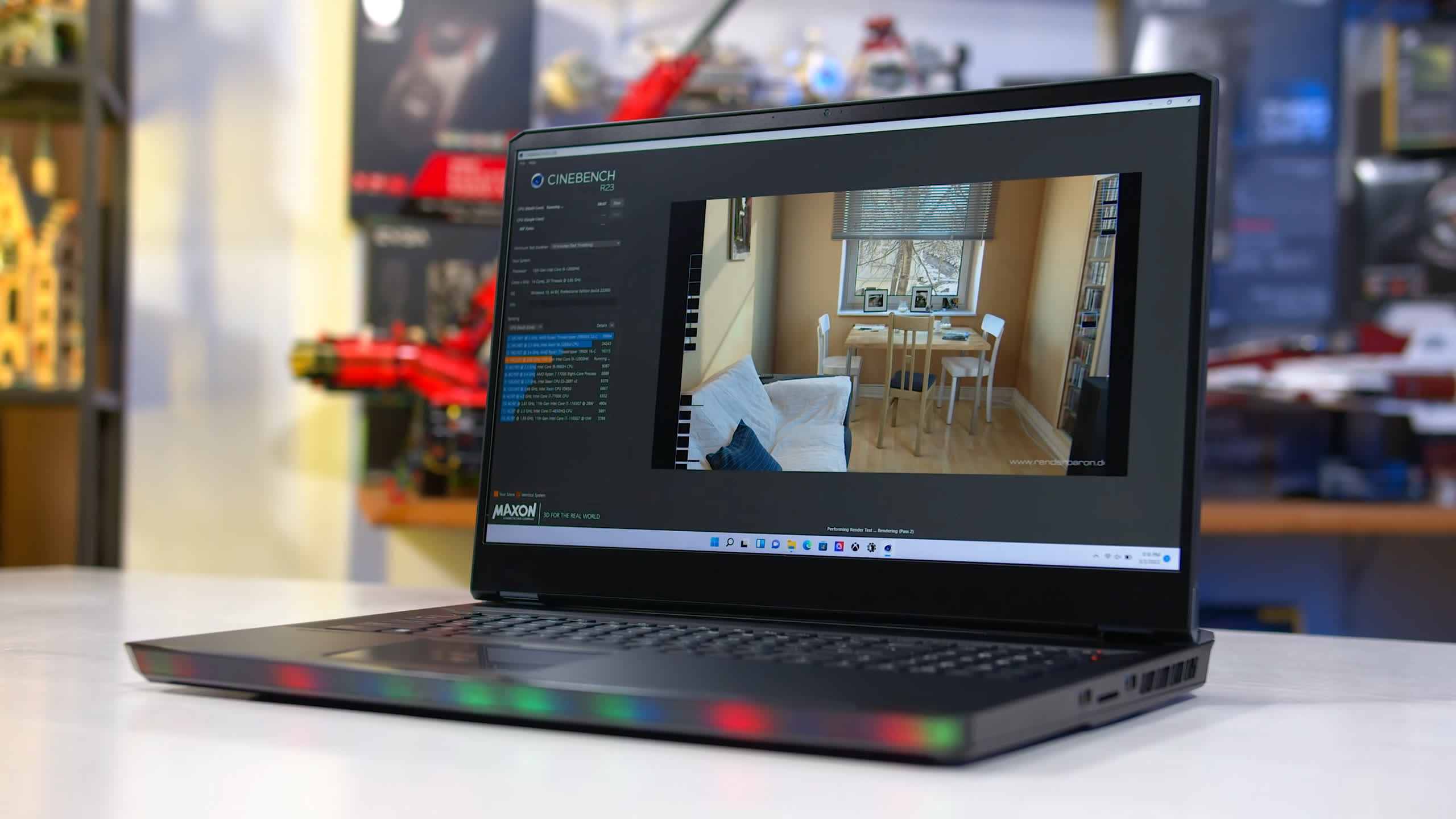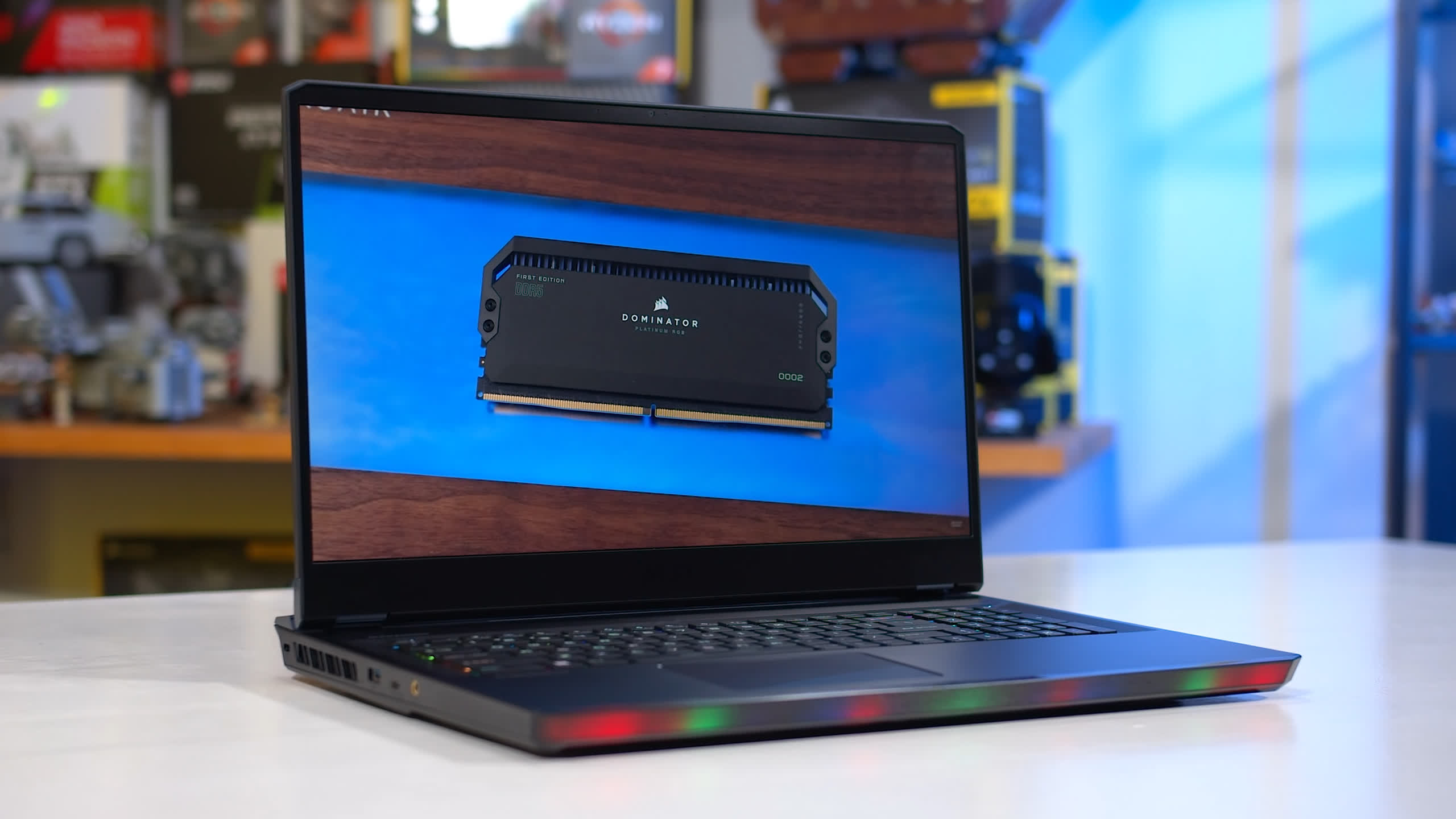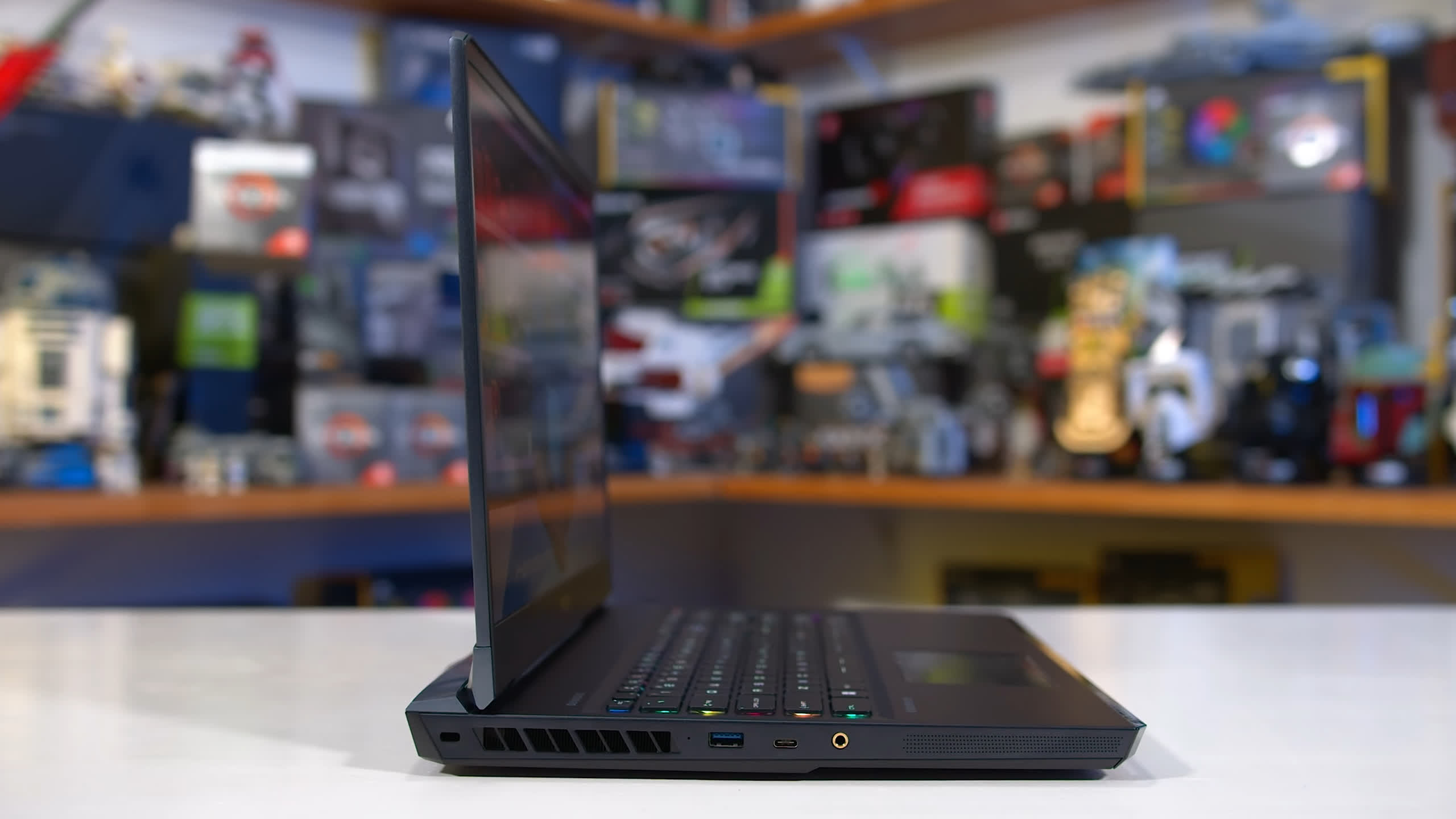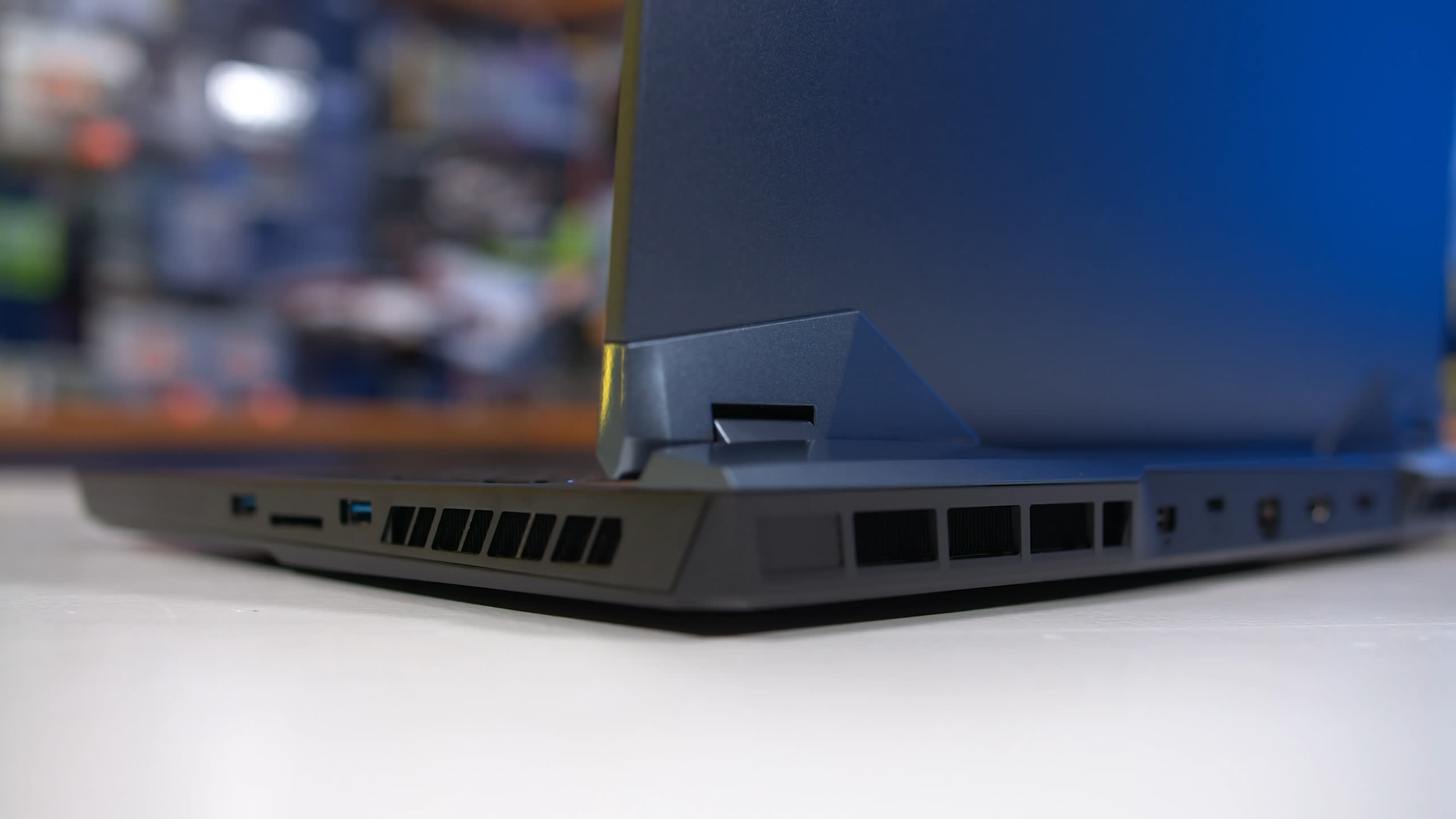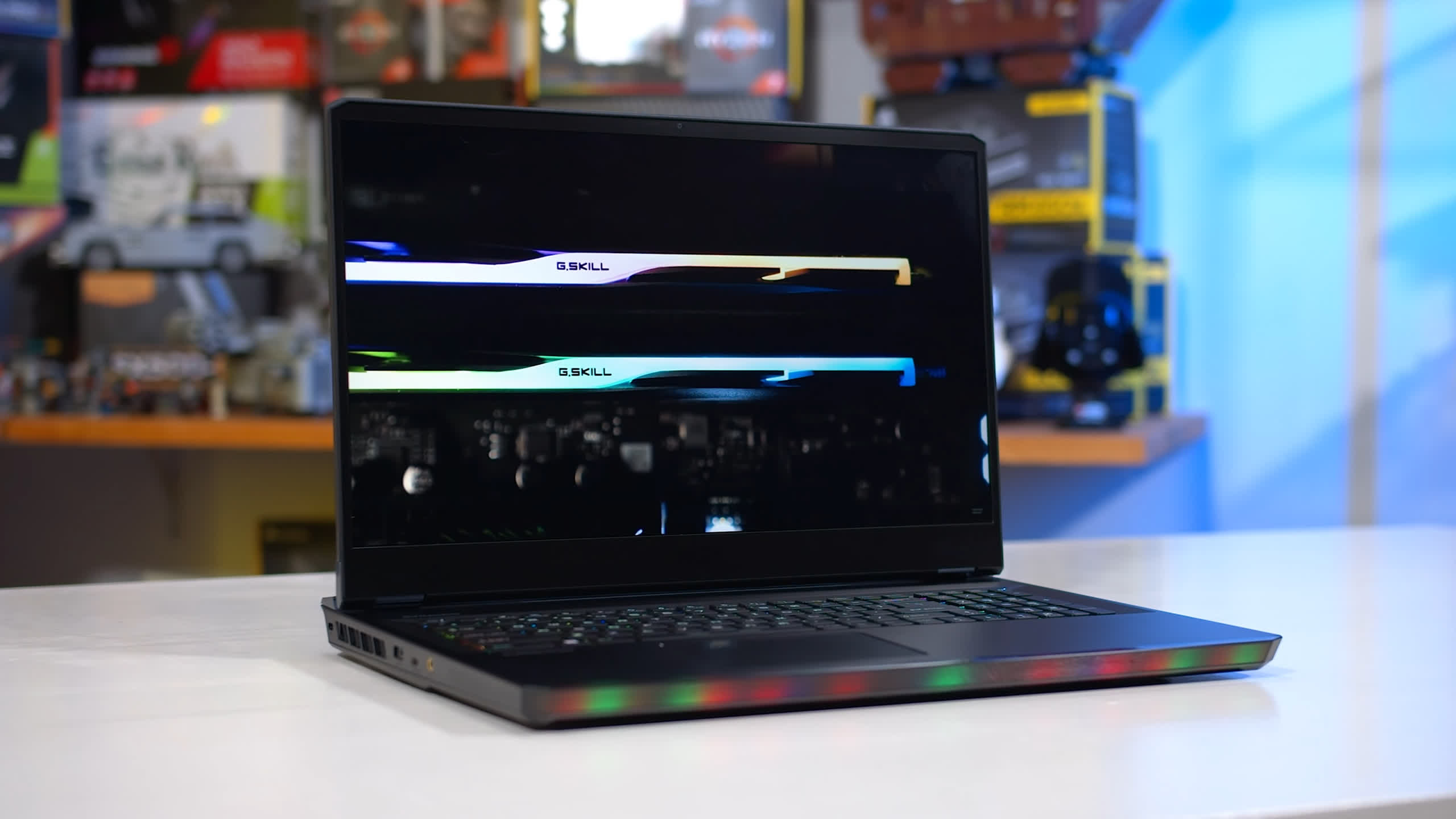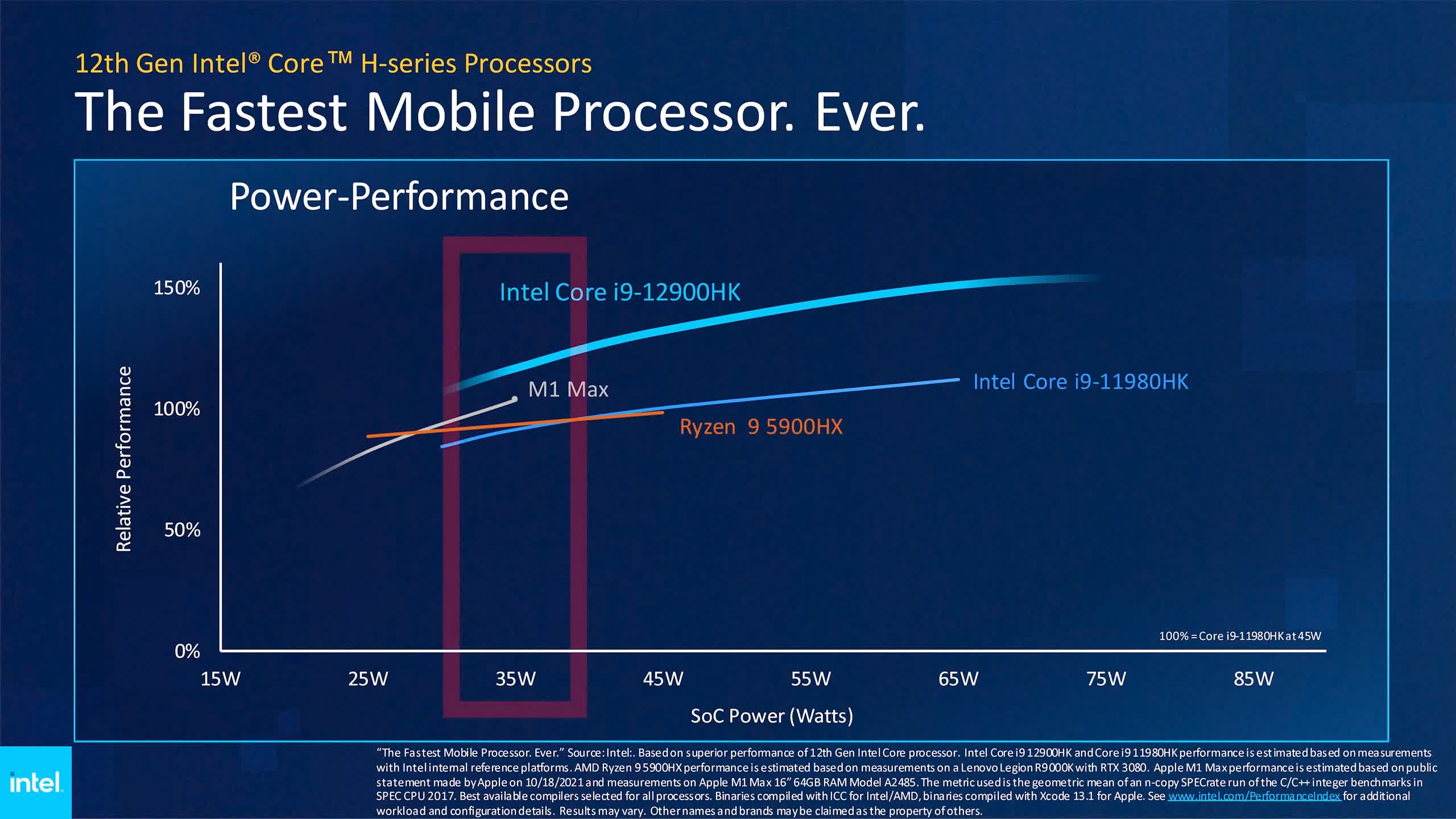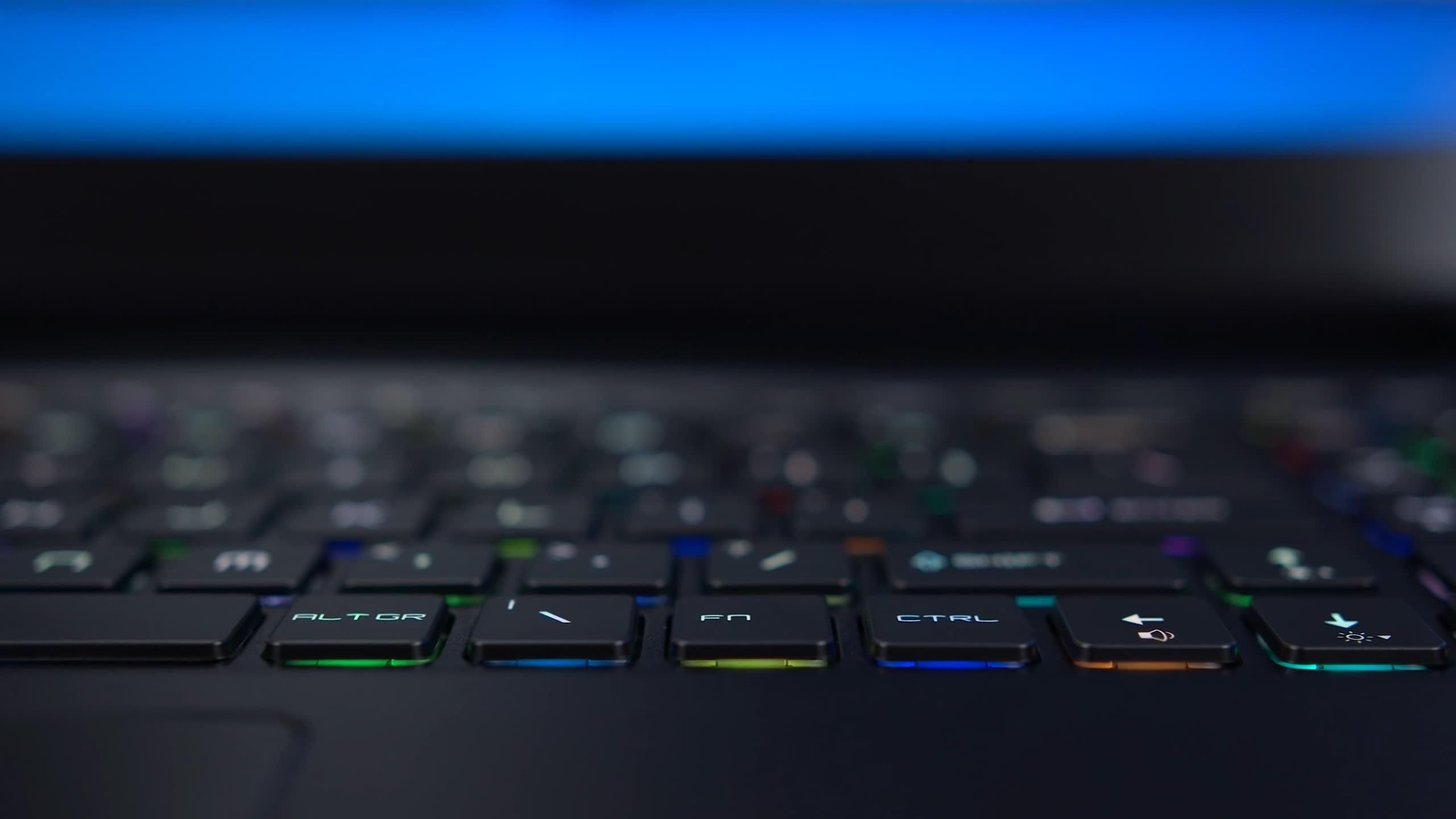The Core i9-12900HK is Intel's most recent and fastest CPU for laptops. In this review we'll be pitting it up against a range of other mobile products, including the beast that is the Apple M1 Pro, so we'll investigate Intel's bold claims of being the fastest mobile CPU.
We'll also compare the 12900HK to the more mainstream Core i7-12700H, which we already looked at, and the new AMD Ryzen 9 6900HS, plus many others.
Next to the i7-12700H, the Core i9-12900HK is a simple clock speed increase: same core configuration, with 6 P-cores and 8 E-cores for a total of 20 threads, but clocks are now between 100 and 300 MHz higher.
For example, the 12900HK can hit 5.0 GHz peak on the P-cores, compared to 4.7 GHz with the Core i7. In the past, we've seen Core i9s being slightly better binned than the Core i7s, so sustained performance is a little better under the same 45W power limit, but we'll have to assess that in today's testing.
The test system for today is the MSI GE76 Raider. We've tested previous iterations of this MSI laptop and it's quite clearly designed for high-end gaming on the go. It now includes not only the 12900HK but also Nvidia's flagship laptop GPU, the GeForce RTX 3080 Ti with a power range of 150-175W.
Whether or not this sort of system is right for you depends on your needs, but I wouldn't say it's designed for portability. Being a 17-inch chassis that weighs over 6 pounds without factoring in the huge power brick, the GE76 is a desktop replacement intended to be hooked up to wall power at all times, and only moved occasionally.
It does have a 99.9 Wh battery, but battery life is pretty bad and I wouldn't want to use it on battery. I prefer slimmer and lighter systems when buying a laptop, but clearly these machines are also popular and aimed at different needs than daily portability.
As for other hardware, the GE76 is equipped with 32GB DDR5-4800 memory in a dual stick configuration, which is what we've seen for all 2022 gaming laptops so far. In this configuration, there's a 17.3-inch 1080p 360Hz display though it's also available in 1440p and 4K options.
Our testing today has been conducted in two power configurations: a long term PL1 power limit of 45W, Intel's default spec for these chips, as well as 75W, which is a common boosted power level seen across many laptop vendors.
These will be compared apples to apples with other laptop chips running at the same configuration, which gives us the best look at how these CPUs compare in a fair benchmark battle.
If we compared one chip at 75W to another at 60W we'd really only be comparing which specific laptop design can send the most power to the CPU, not which CPU actually performs better, which is why we test like this. Boost PL2 power is set to Intel's default of 115W in both instances.
Testing like this also gives you guys the most useful information that can be applied to a wide range of laptops. If you're buying a thinner and lighter system, the 45W numbers will be most important, while those after a beefier system with more cooling power should look at 75W.
On to the results!
Application Benchmarks
In Cinebench R23 multi-threading, when the Core i9-12900HK is limited to its default of 45W, it is the fastest CPU in the chart, with a score of 13400 points. This does allow it to outperform the Apple M1 Pro, although Apple's chip is consuming roughly 35W of package power not 45W, which is a trend you'll see across most of the charts. Still, the 12900HK is the winner here by 8 percent, and in turn it's also faster than AMD's new 35W CPU by 15%.

What perhaps surprised me the most was the margin between the 12900HK and 12700H. There really isn't that much separating these parts, just a 3 percent increase in performance in favor of the Core i9.
Both parts have the same core count and are operating under the same power limit, so the only difference is binning and optimization, which don't appear to be enhancing performance significantly. With that said, the performance gain compared to the 11980HK from last generation is big, a very solid 23% increase.

At 75W, we're seeing a continuation of what was shown at 45W, however the gap between the 12900HK and 12700H has now shrunk to nothing, at least with the models we tested. This does give the Core i9 a 16% lead over the Ryzen 9 6900HS, as Alder Lake is able to deliver higher performance per watt in the high power range than Rembrandt, but it doesn't exactly scream to buyers that the Core i9 is a good value choice over the Core i7.

A larger performance delta between the 12900HK and 12700H was observed in the single-threaded test. With the 12900HK hitting 5 GHz, it's 5 percent faster than the 12700H from a 6 percent boost clock speed difference. That's pretty much as expected. Alder Lake is quite a bit faster than the M1 Pro here, a huge 25% performance lead in single-threaded workloads like this, and 19% faster than AMD's Ryzen 9 6900HS. There's no doubting that Alder Lake's P-cores have the performance crown for single-thread this generation.

There's a mixture of good and bad when looking at the Handbrake results for 45W class CPUs and lower. The 12900HK is faster than the 12700H in this test, but only by 2 percent, which is rather negligible. It's only able to match the Ryzen 9 6900HS as well, despite the 6900HS being a 35W CPU. However the 12900HK is clearly faster than the M1 Pro, despite our M1 testing using the native Apple Silicon version of Handbrake for CPU encoding. The M1 just isn't very good at heavy CPU encoding like this compared to Intel or AMD, which gives the 12900HK a 25 percent performance advantage.

At 75W the results are pretty similar to with Cinebench in that the 12900HK and 12700H delivered basically the same result, and both are a similar margin faster than the 6900HS running at the same power limit (4 percent faster). High power configurations smoke the M1 Pro, at the cost of power consumption which is obviously much higher than Apple's SoC.


Blender was a particularly strong result for Apple Silicon, and here the 12900HK is able to match that part, although at a higher power configuration, 45W vs roughly 35W.
Again we just aren't seeing a huge difference between the 12900HK and 12700H for this heavy multi-threaded test, and nothing I've seen so far suggests it makes sense to buy the Core i9 for these applications. Even at 75W, which more Core i9 laptops are going to be capable of doing, the gap is negligible for the top Intel Alder Lake parts.

For code compilation, our advice is to buy an Alder Lake processor, because they are clearly faster than the competition and older options.
The 12900HK is 32 percent faster than the 11980HK in this Chromium compile, and 24 percent faster than the 6900HS - those are big margins. But once again, a very common theme of this review so far, the 12900HK and 12700H are neck and neck which makes upgrading to the Core i9 a bit pointless.

And then once again at 75W I was seeing basically the same results with the two Alder Lake parts I've tested so far, suggesting there is no performance per watt advantage for the Core i9 at these higher power levels.

In our Matlab testing, the 12900HK and 12700H delivered the same performance, which was a bit of a surprising result given the short timeframe of this workload but here we are, same result.
Aside from the lack of an upgrade going from Core i7 to Core i9, it's still a good result given it's 17 percent faster than the 11980HK and 23% faster than the 6900HS. The M1 Pro is in a rather forgettable position for this application given it has to be run in an emulated mode which destroys performance.

In Microsoft Excel we see the same as before, where the 12900HK and 12700H are neck and neck. Like Matlab, this benchmark is run in the boost state, and we've seen previously that at higher power levels there's really nothing separating these two CPUs. So when both are smashing 100W plus, there's no difference. However Alder Lake is still mighty impressive here, basically destroying every other part in the chart thanks to improvements to cache and the upgrade to DDR5 memory.

PCMark's Applications workload that tests the Microsoft Office suite is one of the strongest results for the 12900HK vs 12700H and we're finally seeing some separation there.
The Core i9 processor is 9 percent faster, which gives buyers some reason to get the Core i9 as that sort of margin is outside our usual margin of calling it a "tie". The 12900HK is also able to hold handy leads over the 6900HS (15%) and the previous 11980HK (21%).

In 7-Zip compression we couldn't spot a difference between the 12900HK and 12700H. Intel is able to hold a performance lead over the M1 Pro, Apple Silicon is fast but the 12900HK is 7 percent faster, albeit at a much higher power level given this is run mostly in the boost state.

But for decompression the fat P-cores are able to gobble up this task nicely, beating the M1 Pro by a huge 52 percent margin. There isn't much separating the 12900HK and AMD's new Ryzen 9 6900HS processor so really all the current gen high-end chips are about equal here.

In Acrobat PDF exporting we see the benefit of the higher single-core turbo clock the 12900HK is capable of versus the 12700H, which increases performance by 4 percent. It's not enough to take top spot off Apple though, the 12900HK comes in 8 percent slower than the M1 Pro in what is one of the strongest results for Apple that I've tested.

Adobe Photoshop is another lightly threaded workload and it's here where the 12900HK is quite impressive, putting up the fastest score yet in the Puget Systems benchmark, 4 percent faster than the 12700H and 17 percent faster than the 6900HS. There's a big reason to upgrade from 11th-gen silicon or older as well, as the 12900HK is a sizable 36 percent faster than the 11980HK.

In FL Studio the 12900HK is the fastest CPU I've tested as well, though it is only 5 percent faster than the 12700H, and the margins between all of these parts is quite small for exporting a track at high quality levels.

Moving over now to some mixed workloads, in Adobe Premiere Pro there is definitely a reason to go for a 12900HK configuration over lower tier parts, especially with a high performance GPU. The GE76 was about 10% faster than the 12700H model with the same RTX 3080 Ti GPU, and this allowed for a 23 percent lead on the M1 Pro. The M1 result is extremely impressive given its overall power level and lack of high performance discrete graphics, but for the absolute best performance this generation you should be going with something Intel, especially as the 12900HK plus 3080 Ti configuration is something like 60 percent faster at exporting.

In After Effects the 12900HK is also the fastest configuration tested and 7 percent ahead of the 12700H model using a similar GPU. That's one of the better results we've seen so far comparing the Core i9 and Core i7 models.

Lastly, we'll look at Agisoft Metashape photogrammetry performance and there's nothing separating the Core i7 and Core i9 systems, which is in line with some of our CPU-heavy workloads in this review. Very fast performance as you'd expect (and want) from a high end system with a powerful CPU and GPU.
Power Scaling, Usage
When looking at CPU power scaling there's only one interesting observation, and that's how the 12900HK fares compared to the 12700H in performance per watt. At least with the samples we've tested so far, the 12900HK is only a very minor improvement in efficiency, and that efficiency gap tapers off at around 75 to 85 watts.
Given the actual silicon is essentially the same, the main reason for the 12900HK's improved efficiency is a better bin on those parts, but for this generation it still looks like the 12700H is receiving very good silicon.
In contrast with the 11980HK vs 11800H, there was a more substantial gap in efficiency across the power range - not a huge gap, but indicative of a greater degree of binning.

Without a larger difference between 12700H and 12900HK performance per watt, the best Alder Lake part isn't quite as efficient as the M1 Pro. We should note that previously we had the M1 Pro at 40W, whereas its actual package power - the same measurement used for Intel and AMD CPUs - is closer to 35W, so we've corrected that here.
The M1 Pro is just 6 percent better at 35W and using a more advanced 5nm process node, so it's not exactly a stunning victory for Apple in multi-thread efficiency - but it is better.
The 12900HK is also slightly more efficient than AMD's new Ryzen 9 6900HS at the same 35W package power, though the difference is negligible.

Where the difference isn't so negligible is in single-thread power as measured at the wall.
The M1 Pro clocking up to just 3.2 GHz is ridiculously efficient in comparison to most other processors in this chart, and that's where it's insane performance per watt and extended battery life comes from - Apple has a big advantage when tasks are lightly threaded.
In contrast, Intel is going for the win with single-thread performance, and that causes a high level of power consumption, 33W when pushing 5 GHz, which is fairly higher than the 12700H despite just a 6 percent increase in frequency.

We were originally going to run a big section on gaming performance for the 12900HK, but the results are extremely boring. In comparison to the Core i7-12700H, the 12900HK performs basically the same across our benchmark suite.
A couple points of margins here and there using the same RTX 3080 Ti Laptop GPU, but on the whole we'd say they perform the same at 1080p gaming, including titles played at low or competitive settings like CS:GO and Rainbow Six Siege.
We have a more detailed breakdown available in our 12700H review, but basically nothing about the 12900HK changes what was seen there. Alder Lake are currently the fastest laptop CPUs for gaming, although the exact margins in comparison to 11th-gen and Ryzen APUs vary, usually up to a 25% gain when CPU limited and much lower when GPU limited. You'll also need a high-end GPU to take advantage of these differences, and be playing at 1080p.
What We Learned
There's two ways you can look at the Core i9-12900HK. On one hand, it's just as impressive as the Core i7-12700H we looked at a few weeks back and packs all the same performance and platform advantages. It's a fast processor, the fastest on the market for multi-thread, single-thread and gaming - and it has a really robust collection of technologies including DDR5 support and PCIe 4.0.
On the other hand, like with the 11th-gen Core i9 series, the 12900HK feels a bit pointless for most buyers. The performance uplift over the 12700H is only a few percent in most cases, and can actually be the same at higher power levels, pointing to only a limited efficiency improvement.
The biggest gains were seen in single or lightly-threaded productivity apps where the boost up to a 5.0 GHz single-core turbo clock is able to deliver a 10 percent performance gain at best. Of course, if you want the best of the best, the Core i9 is that part, but like with a lot of flagship parts, you'll end up paying a hefty premium for a very small real-world upgrade.
Purely looking at Intel's line-up, right now I'd definitely be looking at laptops that use Core i7 processors instead of the Core i9-12900HK. Provided the rest of the configuration is the same, you could end up saving a few hundred dollars. But of course, not every laptop will have a Core i7 option. At times the 12900HK might be your only option, and in those situations there isn't anything wrong with the 12900HK. It very much is a fast laptop processor.
About that M1 Comparison
During Intel's launch presentation, they made a big deal about the 12900HK being the "fastest mobile processor ever," showing the slide below comparing their new part to the M1 Max and older generation parts. Given the M1 Max CPU is the same as the M1 Pro we tested, we can say this slide is partially true and partially misleading.
In this section, where Intel compares the 12900HK to M1 Max at 35W, they show the 12900HK ahead. That can be true depending on the benchmark, but there are more instances where the M1 is either on par or faster at the same power level in our testing.
We're talking small margins for the most part. The Core i9-12900HK is definitely competitive with Apple in performance per watt, but I wouldn't go as far to say it's clearly better.
Where the 12900HK clearly has an edge is in overall performance. At 45W and above, the 12900HK almost always beats the M1 Pro, and when we start pushing up to the 75W range, the Alder Lake Core i9 is a decent amount faster in a lot of heavy CPU workloads. So if you want the absolute fastest workstation laptop for stuff like code compilation, 3D rendering, video editing and so on, the 12900HK will be providing that - especially when equipped with a top end GPU.
But the way in which Intel wins is through increasing power consumption, which is only suitable for certain types of laptop. The MSI GE76 is one of those systems: it's big, it's heavy, it's designed to sit on a desk, and be plugged in most of the time. Intel won't have the same lead on Apple or AMD in thinner battery-oriented systems; performance will be competitive, but you won't see 15 or 20% better performance for CPU heavy tasks.
Which brings us the topic of battery life. We've seen some criticism about Alder Lake's battery life based on testing the GE76, but we don't see much value in that. The GE76 isn't designed with long battery life in mind.
It's clearly larger and heavier than something like the Zephyrus G14 using Ryzen 6000, and is therefore less portable and less likely to be used on battery. I certainly wouldn't want to use a 3kg laptop on the go. So if I sit here and say the GE76 has worse battery life - and let's be clear, it definitely does - I'm simply comparing apples to oranges. And battery life isn't based on the CPU alone, it's also based on the entire platform including the GPU, display and other components, so making broad statements about Alder Lake battery life based on a single system would be misleading.
To fairly compare a CPU like the Core i9-12900HK in battery life to other laptops, we'd basically need the same laptop to test, or alternatively a very similar sort of system. Hopefully that will be possible in the future, but it isn't right now. All we can tell you is the MacBook Pro has excellent battery life, the Zephyrus G14 is pretty good, and the GE76 isn't great. How Alder Lake fairs in battery efficiency overall will remain a mystery until we're able to test systems that are focused on portability first.
Shopping Shortcuts
- Intel Core i9-12900HK Laptops on Amazon
- AMD Ryzen 9 6900HS Laptops on Amazon
- Intel Core i7-12700H Laptops on Amazon
- MSI GE76 Raider on MSI, Amazon
- Apple MacBook Pro M1 on Amazon
- GeForce RTX 3080 Ti Laptops on Amazon
- GeForce RTX 3060 Laptops on Amazon
- GeForce RTX 3070 Laptops on Amazon
- AMD Ryzen 7 5800H Laptops on Amazon
